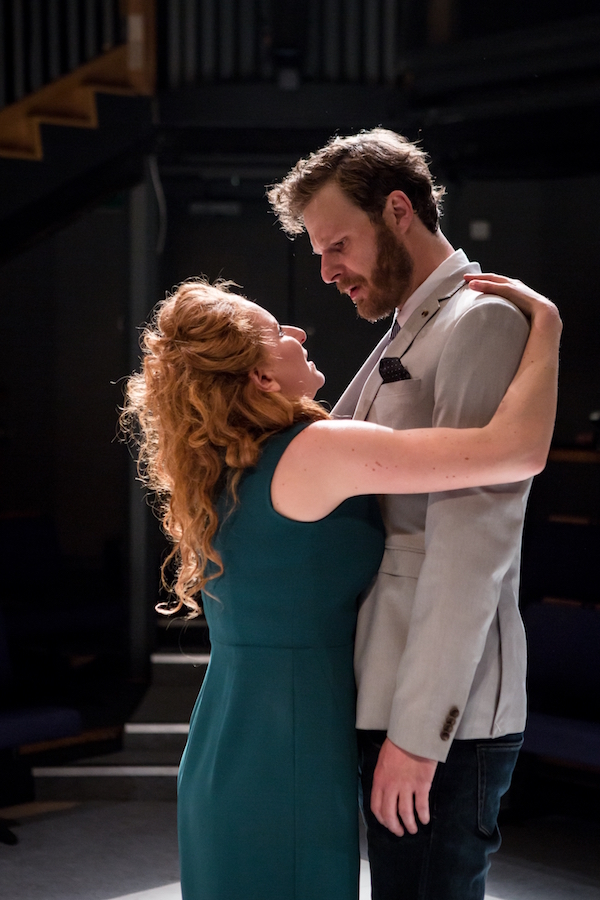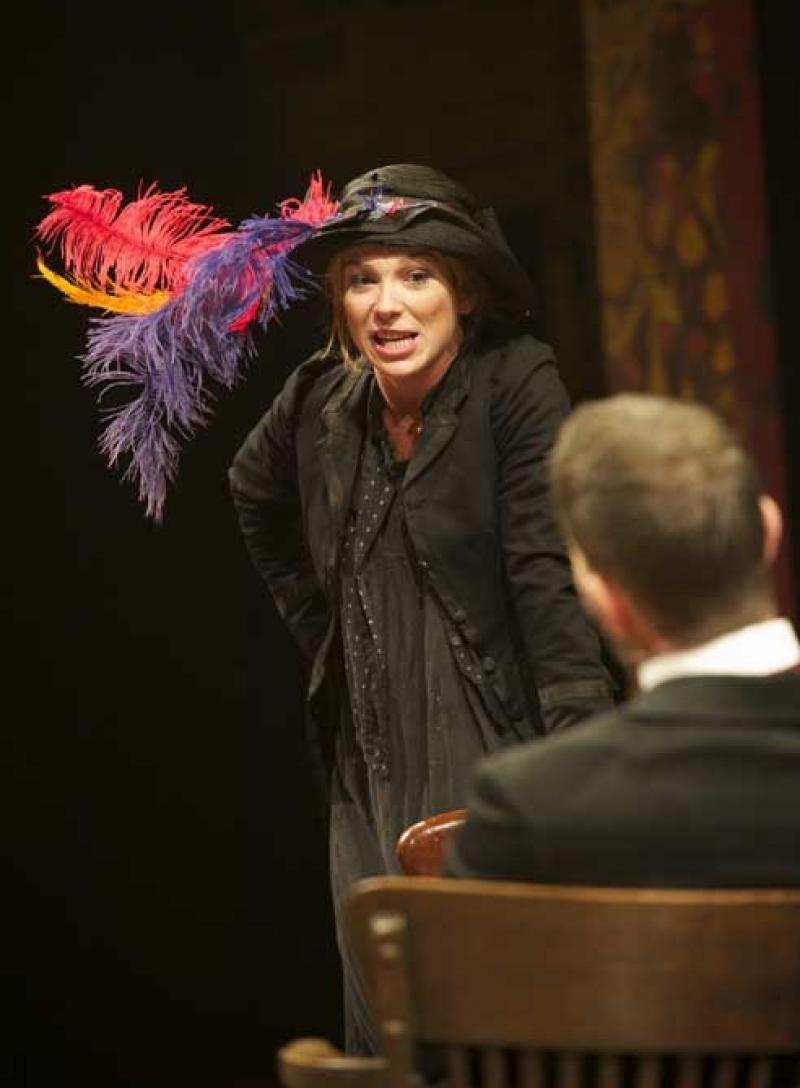The Philanderer, Orange Tree Theatre | reviews, news & interviews
The Philanderer, Orange Tree Theatre
The Philanderer, Orange Tree Theatre
Modern-dress Shaw is resonant but long-winded

Gender deconstruction, fraught feminism and the perils of hook-up culture: George Bernard Shaw’s comedy of manners, penned in 1893, shows we haven’t come as far as we might think. It’s a point rammed home by Paul Miller’s choice of modern dress, but this otherwise pleasantly conventional production cushions its provocations, with the real challenge coming from a near-three-hour running time.
Leonard Charteris (Rupert Young), the eponymous philanderer and a loose Shavian self-portrait, is caught between the woman he loves, sophisticated widow Grace (Helen Bradbury), and the woman who loves him, tenacious limpet Julia (Dorothea Myer-Bennett, pictured below with Young). He proposes to the former as a means of breaking up with the latter, but his scheme is complicated by the intervention of their respective fathers, Colonel Craven (Michael Lumsden) and theatre critic Cutherbertson (Mark Tandy), as well as the lovelorn Dr Paramore (Christopher Staines).
 Miller last tackled one of Shaw’s Plays Unpleasant in 2014, and though this is another accomplished outing, it’s a far cry from the cutting-edge programming that has revolutionised the Orange Tree during his tenure. Shaw’s excessively wordy piece, packed with sub-Wilde epigrams and effortful satire, is in urgent need of a judicious edit and/or bolder staging. Modern dress just muffles the radical nature of a work which, out of fear of censorship, wasn’t staged until 1905.
Miller last tackled one of Shaw’s Plays Unpleasant in 2014, and though this is another accomplished outing, it’s a far cry from the cutting-edge programming that has revolutionised the Orange Tree during his tenure. Shaw’s excessively wordy piece, packed with sub-Wilde epigrams and effortful satire, is in urgent need of a judicious edit and/or bolder staging. Modern dress just muffles the radical nature of a work which, out of fear of censorship, wasn’t staged until 1905.
However, Miller does communicate the fascinating tensions of this fin-de-siecle moment, with Victorian mores beginning to be eroded by “advanced views”. The play’s younger generation belongs to The Ibsen Club, which – taking A Doll’s House as a call to action – bans all overtly manly men and womanly women (no lipstick feminism allowed). Charteris is a cynical exponent of this philosophy, manipulating it to suit his own interests. If no woman is the property of a man, he can seduce multiple women without feeling he owes them commitment; after all, they’re the ones rejecting marriage. But that leaves girls like Julia, trying to escape the straitjacket of unhappy matrimony, stuck in romantic limbo instead.
Despite Young deploying all of his twinkly-eyed charm, it’s hard to warm to the glib, condescending yet supposedly irresistible Charteris, whom Shaw declines to invest with much inner life. Myer-Bennett seizes control of the play, her fiery Julia both calculating the effect of well-deployed histrionics and genuinely despairing, at one point abandoning all dignity to crawl across a pouffe as she begs for mercy. Bradbury has less to work with, but provides a solid contrast with her Claire Underwood-esque haircut and froideur, and rigorously calls Julia on her use of tears to solicit male indulgence.
 Lumsden and Tandy (pictured above) are entertaining as the baffled old guard, and the former provides the comic highlight when Staines’s wonderfully myopic Dr Paramore realises the liver disease he “discovered” – giving Craven just a year to live – has been disproved by better-funded European rivals who were able to carry out tests on more than just “three dogs and a monkey”. The misdiagnosis, points out the vexed Craven, meant he wasted a year turning vegetarian and going to church. Staines also gives Mark Gatiss’s Shpigelsky a run for his money on the ham-fisted proposal front as he scuttles around nervously on a wheelie medical stool. It’s one of several witty Simon Daw props, along with a suspended, slowly rotating Ibsen bust.
Lumsden and Tandy (pictured above) are entertaining as the baffled old guard, and the former provides the comic highlight when Staines’s wonderfully myopic Dr Paramore realises the liver disease he “discovered” – giving Craven just a year to live – has been disproved by better-funded European rivals who were able to carry out tests on more than just “three dogs and a monkey”. The misdiagnosis, points out the vexed Craven, meant he wasted a year turning vegetarian and going to church. Staines also gives Mark Gatiss’s Shpigelsky a run for his money on the ham-fisted proposal front as he scuttles around nervously on a wheelie medical stool. It’s one of several witty Simon Daw props, along with a suspended, slowly rotating Ibsen bust.
Miller uses both of Shaw’s endings, giving us a bleak postscript that debates Victorian divorce proceedings. Whether marrying for love, money, to satisfy social convention or as a refuge from loneliness, there is no guarantee of happiness, so a painless exit is crucial, argues Shaw. It’s a bracing final message from an often flippant play.
MORE GEORGE BERNARD SHAW ON THEARTSDESK
Mrs Warren's Profession, Comedy Theatre (2010). Felicity Kendal in plodding revival of Shaw's take on prostitution
 Pygmalion, Chichester Festival Theatre (2010). Rupert Everett's sulky Higgins is outsmarted by Honeysuckle Weeks's Eliza (pictured)
Pygmalion, Chichester Festival Theatre (2010). Rupert Everett's sulky Higgins is outsmarted by Honeysuckle Weeks's Eliza (pictured)
The Doctor's Dilemma, National Theatre (2012). Tragedy is the spoonful of sugar that helps this medical satire go down
Widowers' Houses, Orange Tree Theatre (2014). A timely revival of a timeless satire
Man and Superman, National Theatre (2015). A theatrical trip to Hell with Ralph Fiennes has some heavenly moments
Saint Joan, Donmar Warehouse (2016). Revival of Shaw classic is a tour de force for Gemma Arterton
rating
Explore topics
Share this article
The future of Arts Journalism
You can stop theartsdesk.com closing!
We urgently need financing to survive. Our fundraising drive has thus far raised £49,000 but we need to reach £100,000 or we will be forced to close. Please contribute here: https://gofund.me/c3f6033d
And if you can forward this information to anyone who might assist, we’d be grateful.

Subscribe to theartsdesk.com
Thank you for continuing to read our work on theartsdesk.com. For unlimited access to every article in its entirety, including our archive of more than 15,000 pieces, we're asking for £5 per month or £40 per year. We feel it's a very good deal, and hope you do too.
To take a subscription now simply click here.
And if you're looking for that extra gift for a friend or family member, why not treat them to a theartsdesk.com gift subscription?
more Theatre
 Macbeth, RSC, Stratford review - Glaswegian gangs and ghoulies prove gripping
Sam Heughan's Macbeth cannot quite find a home in a mobster pub
Macbeth, RSC, Stratford review - Glaswegian gangs and ghoulies prove gripping
Sam Heughan's Macbeth cannot quite find a home in a mobster pub
 The Line of Beauty, Almeida Theatre review - the 80s revisited in theatrically ravishing form
Alan Hollinghurst novel is cunningly filleted, very finely acted
The Line of Beauty, Almeida Theatre review - the 80s revisited in theatrically ravishing form
Alan Hollinghurst novel is cunningly filleted, very finely acted
 Wendy & Peter Pan, Barbican Theatre review - mixed bag of panto and comic play, turned up to 11
The RSC adaptation is aimed at children, though all will thrill to its spectacle
Wendy & Peter Pan, Barbican Theatre review - mixed bag of panto and comic play, turned up to 11
The RSC adaptation is aimed at children, though all will thrill to its spectacle
 Hedda, Orange Tree Theatre review - a monument reimagined, perhaps even improved
Scandinavian masterpiece transplanted into a London reeling from the ravages of war
Hedda, Orange Tree Theatre review - a monument reimagined, perhaps even improved
Scandinavian masterpiece transplanted into a London reeling from the ravages of war
 The Assembled Parties, Hampstead review - a rarity, a well-made play delivered straight
Witty but poignant tribute to the strength of family ties as all around disintegrates
The Assembled Parties, Hampstead review - a rarity, a well-made play delivered straight
Witty but poignant tribute to the strength of family ties as all around disintegrates
 Mary Page Marlowe, Old Vic review - a starry portrait of a splintered life
Tracy Letts's Off Broadway play makes a shimmeringly powerful London debut
Mary Page Marlowe, Old Vic review - a starry portrait of a splintered life
Tracy Letts's Off Broadway play makes a shimmeringly powerful London debut
 Little Brother, Soho Theatre review - light, bright but emotionally true
This Verity Bargate Award-winning dramedy is entertaining as well as thought provoking
Little Brother, Soho Theatre review - light, bright but emotionally true
This Verity Bargate Award-winning dramedy is entertaining as well as thought provoking
 The Unbelievers, Royal Court Theatre - grimly compelling, powerfully performed
Nick Payne's new play is amongst his best
The Unbelievers, Royal Court Theatre - grimly compelling, powerfully performed
Nick Payne's new play is amongst his best
 The Maids, Donmar Warehouse review - vibrant cast lost in a spectacular-looking fever dream
Kip Williams revises Genet, with little gained in the update except eye-popping visuals
The Maids, Donmar Warehouse review - vibrant cast lost in a spectacular-looking fever dream
Kip Williams revises Genet, with little gained in the update except eye-popping visuals
 Ragdoll, Jermyn Street Theatre review - compelling and emotionally truthful
Katherine Moar returns with a Patty Hearst-inspired follow up to her debut hit 'Farm Hall'
Ragdoll, Jermyn Street Theatre review - compelling and emotionally truthful
Katherine Moar returns with a Patty Hearst-inspired follow up to her debut hit 'Farm Hall'
 Troilus and Cressida, Globe Theatre review - a 'problem play' with added problems
Raucous and carnivalesque, but also ugly and incomprehensible
Troilus and Cressida, Globe Theatre review - a 'problem play' with added problems
Raucous and carnivalesque, but also ugly and incomprehensible
 Clarkston, Trafalgar Theatre review - two lads on a road to nowhere
Netflix star, Joe Locke, is the selling point of a production that needs one
Clarkston, Trafalgar Theatre review - two lads on a road to nowhere
Netflix star, Joe Locke, is the selling point of a production that needs one

Add comment